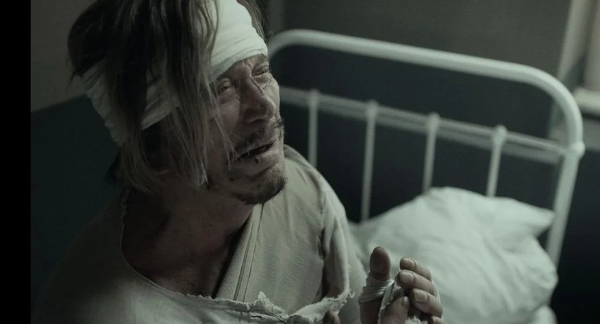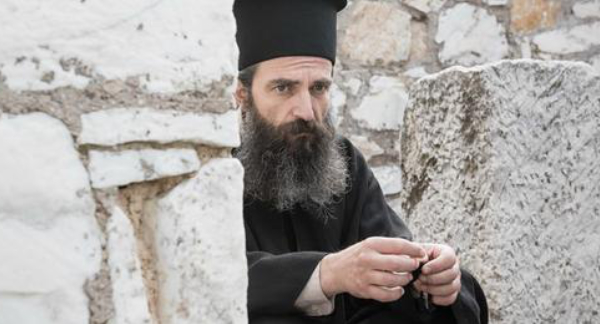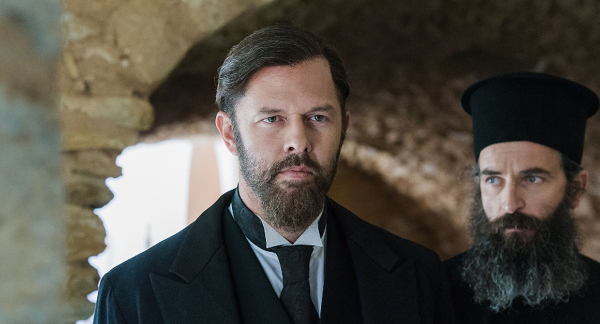During the season of Lent, the Church enters in a more profound and tangible way, into the Paschal Mystery of Christ who suffered and died for each one of us. Christ calls us to unite our sufferings to his on the cross to realize that redemption comes through struggle, light through darkness, and holiness through the overcoming of sin. It is refreshing to see a feature film that illustrates just that without trying to be a religious film. Yelena Popovic wrote and directed a most beautiful and touching story of the life of Eastern Orthodox Saint Nektarios of Aegina, a monk and metropolitan bishop who only sought to live the life of Christ in the fullest manner possible. She says that one of the main reasons for making this film is, “I’ve experienced grace within the Church, and it saved me.” She continues, “The Church is a spiritual hospital…and offers a path of true happiness.” This film is how one man, “chose the path of love and forgiveness,” says Popovic.
Mickey Rourke also has an appearance in the film as a paralyzed man healed through St Nektarios. His devotions to St Jude and St Michael, as well as the rosary, has led him to take roles in films such as this that speak of integrity and spirituality. He says he took this role because, "I have an affinity for pictures about the saints."

Mickey Rourke in Man of God. © 2022 Pinnacle Peak Pictures. All rights reserved.
Aris Servetalis, a popular Greek actor, plays the role of St Nektarios with such grace, depth of emotion, and a transformative gaze. I couldn’t stop looking at his eyes feeling the pain of betrayal expressed on his facial features and the humble spirit in his penetrating gaze. Only a person who understands the power of faith and inner suffering can play such a lead role with delicacy and inner strength. Seretalis experienced a major conversion prior to making this movie after saying he reached the bottom in life and God saved him. Nektarios is known for miracles through his intercession. Perhaps he interceded for Seretalis knowing he would represent him so thoroughly in this story.
The film begins with Nektarios in Egypt, a beloved bishop by many including non-Christians, but especially the poor, the suffering, and sinners. If this is sounding very Christ-like, well it is. Through his prayers, paralytics were healed, the poor received food, and sinners felt loved as human beings. And for this, he was persecuted, not from unbelievers, but from within the Church itself. The early Church Fathers call this white martyrdom, which Pope Gregory the Great describes as a separation of all that one loves through a permanent pilgrimage on behalf of Christ. It does not involve the shedding of blood but the shedding of the ego to the point that one becomes Christ, as St Paul reflects in his Letter to the Galatians. In some ways, this is a more painful suffering since it is prolonged and emotionally distressing.

Aris Seretalis as Nektorios in Man of God. © 2022 Pinnacle Peak Pictures. All rights reserved.
I always wonder why people in the Church spend so much energy fighting others within when there is so much evil in the world that needs our words, works, and wisdom. Instead, we waste our energies and time with such pettiness. Many of the saints suffered this type of persecution from within the Church, and Nektarios is no exception, though his humble acceptance is quite miraculous and otherworldly.
The Patriarch Sephronius, the Pope of Alexandria and all Africa, was Nektarios' mentor and spiritual father who guided him in his vocation. Out of jealousy, other prelates slandered Nektarios’ name to the Patriarch who believed their testimony and exiled Nektarios out of Egypt back to Greece. But while in Athens, Nektarios could not find any means to support himself since the Synod would not assign him a diocese to shepherd. No one wanted him and no one gave him anything, except the poor, to whom he gave even the shoes on his feet. There were continuous letters sent from the dioceses in Egypt to the dioceses in Greece making up calumnious accusations against him. When a priest passed by him saying, “Your Eminence, they are persecuting you from Athens,” to which he responded, “God bless them!”
Nektarios finally was sent by a Minister of the State to a small island to be a preacher and live an anonymous life in the Church, though many people wanted him to be the next Patriarch. He later became the director of an ecclesiastical school. He wrote to Sephronius multiple times telling him of this appointment and asking his forgiveness for whatever he did that may have offended His Holiness. He never received an answer.

Man of God © 2022 Pinnacle Peak Pictures. All rights reserved.
Nektarios’ holiness generated profound words of wisdom that drew people to him. Though he lived in the late 19th century, his words are applicable to people of any time and any era, like most great saints. In the film, the young man, Kostas (Aleksandr Petrov) became his assistant and published several of Nektarios’ spiritual writings, always hoping he would become Patriarch. Nektarios would respond, “You don’t have to be a Patriarch to do great things.” And later when Kostas pressed the issue, “When you become a Patriarch you become a man of power, and power is like a cancer…. Many great men have fallen because of the power they’ve been given. I’d rather not fall into that trap.” The President of the school despised him and questioned his motives, to which Nektarios asked, “Do you have peace, Mr. President?” He said he does not, but it doesn’t matter because he is about seeking the truth. The bishop replied, “Without peace in your heart you will never be able to find the truth.”
Again and again, persecution followed the holy bishop. Even after he began a monastery of nuns with a group of young women desiring a holy life on the island of Aegina, slander followed him. Just when you think there is only so much one person can bear, the film persistently portrays Nektarios' profound interior suffering through the scenes of his prayer to God, when he calls out, “What do want me to do? What is your will?” In these moments of prayer, Nektarios was transformed into a vessel through which God worked multiple miracles of healing and grace.

Aris Seretalis as Nektorios in Man of God © 2022 Pinnacle Peak Pictures. All rights reserved.
Saint Nektarios is a symbol of humble surrender to whatever is before us, even unjust persecution and the pain of being misunderstood. He lived simply at the end of his life in the monastery he built for the nuns to which he was spiritual father. That monastery still stands today containing the remains of one of Greece’s most notable saints.
This film is a meditation on the sanctifying power of suffering. It challenged me to consider how insignificant my sufferings are in comparison with what Saint Nektarios experienced, yet even as insignificant as they may be, they are my path to holiness. This film can put life into proper perspective and hopefully lead many people to reflect on the meaning and purpose of suffering in their lives, as not something to be removed, but to be lived with humility and integrity. That is the key to holiness. That is the heart of the Man of God.
If you seek to be inspired, go see this film in theaters on March 21st and 28th.
About the Author

Sr. Nancy is the Director of the Pauline Center for Media Studies and a Media Literacy Education Specialist. She has degrees in Communications Arts and a Masters in Theology and the Arts from Fuller Theological Seminary. She has extensive experience in the creative aspects of social media, print media, radio and video production as well as in marketing, advertising, retail management and administration.
Sr. Nancy has given numerous media mindfulness workshops, presentations and film retreats around the country to youth, young adults, catechists, seminarians, teachers and media professionals helping to create that dialogue between faith and media. She is a member of NAMLE (National Association of Media Literacy Educators), SIGNIS (World Catholic Association for Communicators) and THEOCOM (Theology and Communications in Dialogue) and board member of CIMA (Catholics in Media Associates). She is the author of a theology of popular culture called, A Sacred Look: Becoming Cultural Mystics from Wipf & Stock Publishing. Sr. Nancy is a theologian, national speaker, blogger and film reviewer.